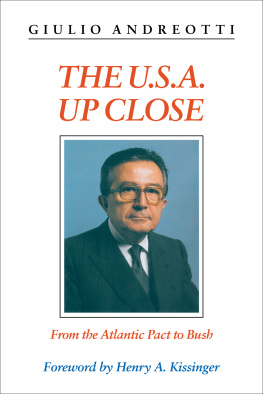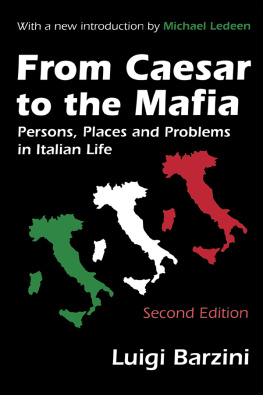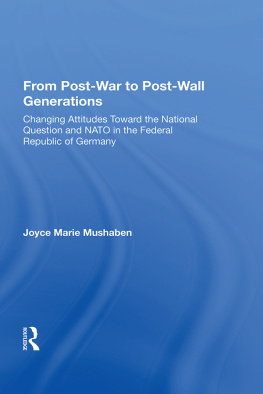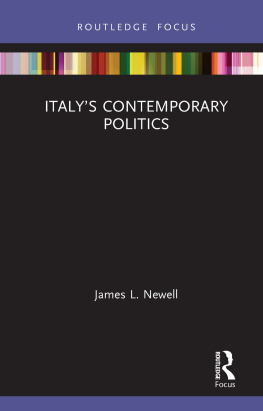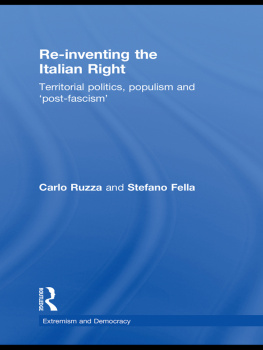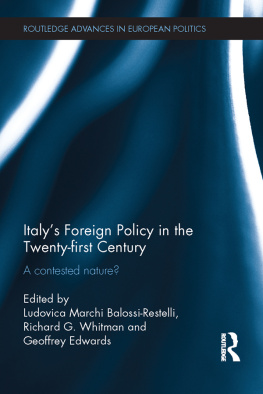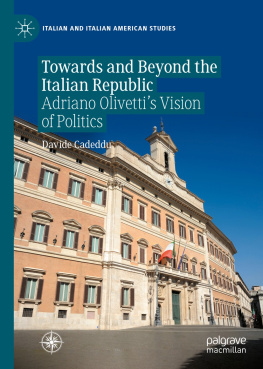Thank you for buying this ebook, published by NYU Press.
Sign up for our e-newsletters to receive information about forthcoming books, special discounts, and more!
Sign Up!
About NYU Press
A publisher of original scholarship since its founding in 1916, New York University Press Produces more than 100 new books each year, with a backlist of 3,000 titles in print. Working across the humanities and social sciences, NYU Press has award-winning lists in sociology, law, cultural and American studies, religion, American history, anthropology, politics, criminology, media and communication, literary studies, and psychology.
The U.S.A. Up Close
Copyright 1992 by New York University
All rights reserved
Manufactured in the United States of America
Library of Congress Cataloging-in-Publication Data
Andreotti, Giulio.
[USA visti da vicino. English]
The U.S.A. up close: from the Atlantic Pact to Bush / Giulio
Andreotti : translated from the Italian by Peter C. Farrell.
p. cm.
Translation of: Gli USA visti da vicino.
copyrightIncludes index.
ISBN 0-8147-0604-5 (cloth)
1. United StatesForeign relationsItaly. 2. ItalyForeign
relationsUnited States. 3. United StatesForeign
relations19451989. 4. Andreotti, GiulioJourneysUnited
States. 5. Visits of stateUnited States. 6. Visits of state
Italy. I. Title. II. Title: USA up close.
E183.8.18A5313 1992
327.73045dc20
91-382.48
CIP
New York University Press books are printed on acid-free paper,
and their binding materials are chosen for strength and durability.
Foreword
No Italian leader has made a greater contribution to the postwar history of his country than the author of this volume, Giulio Andreotti. Prime minister six times, member of cabinets for twenty-three of the last thirty years, he has been so inextricably related to the Italian political evolution that no adult Italian can remember a government that Andreotti did not either head or shape. And every U.S. secretary of state since Dean Acheson and every president since Truman has had to deal with this extraordinary statesman. These assertions run counter to many American stereotypes which cast Italian governments in a mold characterized by a high degree of instability marked by frequent changes of cabinet and elections perplexing to an electorate used to a two-party system.
The reality of Italy is in fact quite different. No European country has made more dramatic economic progress since the end of World War II than Italy. None has had a basically more stable government. This is why Italy has triumphantly overcome huge handicaps. There was the legacy of thirty years of fascism and of military defeat in World War II, while possessing the sparsest natural resources of any of Europes major powers. Totalitarianism and defeat had sharpened the differences between North and South Italy that reflect nearly a thousand years of separate development. Western Europes largest and most disciplined Communist party threatened its nascent democracy. Italys industrial plant was devastated even though it had not achieved international competitiveness even before the war.
Today, Northern Italy may well be the most dynamic and inventive economy in Europe. Italian democracy has surmounted the challenges of both communism and terrorism. And no country has been a steadier supporter of the North Atlantic Alliance. Refuting the views of some Gaullist advocates of European integration, Italy has proven that Atlantic partnership is compatible with devotion to European unity, indeed that both sides of the Atlantic gain through such a partnership. No government has more consistently backed European federal institutions and economic integration than Italys.
The assertion that Italian governments are fundamentally stable may strike American readers as odd, given the frequent rotation of Italian prime ministers. But if one compares the composition of American and Italian cabinets over the past thirty years there is much more continuity in the Italian government. For the core group of Italian leaders tends to alter only very gradually. The same personnel appear in successive cabinets even while their posts are changed from time to time.
The Italian political system permits the expression of many different shades of view represented in various political parties, most with around 10 percent of the total vote. The largest democratic partythe Christian Democratsoscillates between 30 and 35 percent but it is composed of many factions, almost as independent as political parties, which permit it to adjust to dominant currents by only slight shifts in leadership. The Communist party, with around 25 percent of the vote, has so far been outside the system.
This is the politics of an ancient country grown wary from many shattered illusions, grown skeptical from having watched empires rise and fall on its very soil, cautious of excessive enthusiasm, but tenacious in pursuit of its values which, given the Italian character, will always be judged by their human quality. No people prizes the individual more than the Italian; hence the insistence on translating high-sounding claims to propositions relevant to family and day-to-day experience. Americans seek the limitations of governmental power in constitutional guarantees. Italians bring it about through a common sense, matter-of-fact endurance which makes it nearly impossible to enforce any law contrary to fundamental popular instinct.
This is why Italian politicians are as different from the American as night and day. American political figures operate in a system that believes every problem has a solution and that in turn those solutions are reflections of individual leadership. Hence, the overwhelming emphasis on self-assertion and the dramatic. Italian political figures on the other hand operate in an environment ever suspicious of charismatic claims and reluctant to accept any hint of a personal tour de force. Italians derive their reassurance not from star quality but from a performance that makes the individual leader dispensable. This produces an emphasis on anonymity, on skillfully operating the system, not on transcending it.
Giulio Andreotti has been the most durable and in many ways the most brilliant of this type of political leader. Meeting him for the first time, Americans might be amazed that a personality so unobtrusive in appearance and conduct could have dominated Italian politics for close to three decades. Nor would they immediately comprehend his low-key, almost antidramatic style. They would not be familiar with a political code that insists on always doing more than you claim and, above all, being far more powerful than you appear.
But closer acquaintance would leave no doubt about Andreottis significance. He has been prime minister six times; no cabinet has been formed without his blessing for at least two decades. He has been closely identified with Italys postwar achievements ever since he served as the secretary to the great Prime Minister De Gasperi in the late forties when Italys postwar democracy fought off a Communist onslaught.
Giulio Andreotti has achieved this dominance because he possesses one of the sharpest and subtlest minds of his generation. His understated behavior reflects his conviction that a policy based on brilliant analysis needs no fanfares. Americans have reason to be grateful that in Andreotti high intelligence is clearly related to commitment to Western values and friendship with the United States.

